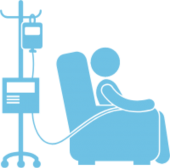Treatment
The National Cancer Institute provides several types of treatment for cancer patients. The major types of treatment include surgery, chemotherapy and radiotherapy. Treatment plans are developed by expert Consultants, following diagnostic tests and investigations. The type of treatment offered to the patient will depend upon the type of cancer and its development. The hospital has a number of clinical experts in all areas of treatment, including leading Consultant Surgeons and Consultant Oncologists that address individual treatment needs. If you would like further information about your treatment, please discuss with your individual Consultant.

SURGERY
Some patients will require surgery to treat their cancer. Our Surgical Consultants and trainees carry out both major and minor surgeries to treat many different types of cancer. During the surgical procedure, an Anaesthetic will also be present to oversee the sedation and management of pain. If the patient require major surgery they may be requested to stay in the surgical wards, where the surgical team will provide follow up care. If the patient requires further information or assistance regarding their surgery, please contact our Surgical Consultants.
- Bone Marrow Transplant
The National Cancer Institute plans to provide a new bone marrow transplant facility for the treatment of cancer patients. This will be a revolutionary advancement for the hospital. Bone marrow transplant treatment can have a hugely beneficial effect, particularly for those with leukaemias, lymphomas and myelomas.


CHEMOTHERAPY
Patients may be required to have chemotherapy treatment when they visit the hospital as an outpatient or stay as an inpatient. Patients who visit the hospital as an outpatient may be treated in the day unit, whereas patients who stay in as an inpatient will be admitted to the medical wards where they will receive treatment.
The aim of chemotherapy is to treat the patient, and improve their health status. Chemotherapy consists of a combination of anti- cancer drugs, which target and kill the cancerous cells. The form of chemotherapy prescribed, and the combination of drugs, will depend upon the type of cancer the patient has.
The day unit provides chemotherapy treatment for outpatients. Outpatients include patients who may not be required to stay in the hospital, and are able to visit the hospital only when treatment is scheduled. The day unit enables patients to resume every day life. The unit provides a comfortable environment for patients and is operated by fully trained clinicians and nurses.
Patients will also receive chemotherapy treatment when staying in one of the medical wards. The Consultant-led team administrates the chemotherapy treatment. During their time on the wards, patients will have access to a team of fully trained clinicians, nurses and support workers. Patients will be provided with warm meals. They will also have access to the ward facilities, including toilet and shower facilities, as well as electronic appliances. You can read about additional support facilities under the section ‘Patient Support Services‘.
RADIOTHERAPY
The National Cancer Institute is the premier treatment center for radiotherapy in the country. Radiotherapy treatment may be offered to patients as part of their treatment program. A multidisciplinary team of fully trained clinical oncologists, medical physicists, radiotherapists, radiographers and technical assistants runs the radiotherapy services at the hospital.
The type of radiotherapy treatment offered to the patient will depend upon their condition. The Consultant Oncologist gives each patient a personalised treatment plan. The Hospital offers a range of radiotherapy techniques, including brachytherapy, radioactive iodine treatment, and teletherapy.

Brachytherapy is a non-harmful technique that involves placing radioactive material inside the body. This radiotherapy technique allows the doctors to deliver radio-therapeutic treatment to specific sites inside the body and treat the cancer directly. The treatment time is usually short with brachytherapy. The National Cancer Institute hosts one machine available to assist in the performance of brachytherapy.
Radioactive iodine treatment is a radiotherapeutic technique. During the treatment, patients are given iodine – which treats the cancer within the body. This technique is particularly used for patients with thyroid cancer.
A total of 24 patients are given iodine treatment monthly. The iodine ward has a total of six rooms where a maximum of six patients are placed under isolation. Patients will be requested to stay in the room throughout the treatment. These rooms are attached with bathrooms and toilets, and are provided with a satellite TV facility in order to keep patients occupied during their isolation.
In terms of health and safety, all necessary precautions have been adopted to prevent the hospital workers and patients and the general public form being exposed to radiation. Two delay tanks are located away from this area to collect and neutralize the urine and excreta of patients of the iodine ward. All radiation protection equipment and monitoring is carried out under the guidance of the Atomic Authority of Sri Lanka.
There are six cobalt machines that assist in the provision of teletherapy treatment. Approximately 15 patients are given treatment daily. During teletherapy treatment patients are requested to lie down on a treatment bed whilst the treatment is carried out. Teletherapy is a non-invasive procedure, which uses external radiation to treat the cancer. During the treatment the radioactive isotope called cobalt-60 is directed at the specific cancer sites within the body, where it emits radioactive beams. These beams are absorbed and kill the cancer cells, and therefore can improve the patient’s health status. During the treatment, the hospital clinicians and assistants will be there to support patients and respond to any queries.
A new LINAC machine is also in the process of being installed at the hospital. When installed the new LINAC will provide an effective means of teletherapy treatment.
